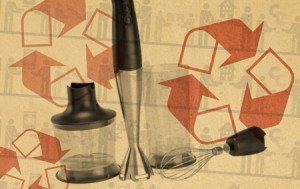Transforming the way we live
Why buy when you can borrow?

I own a great little kitchen gadget called a ‘Stickmaster Pro’ but through years of use the blender bowl has become cracked and eventually the mechanism that holds the blade snapped off. Being the closet greenie that I am, I was determined not to replace the whole appliance but rather just get a replacement for the broken part.
Lucky I am patient because it was over 8 weeks and several phone calls before my replacement part finally arrived. I am a huge advocate for only buying what we need and using our purchases until they can no longer be repaired, rather than replacing them when something better comes on the market, but when ordering a simple replacement part takes so long it is no wonder so many people just throw things in the bin and get a new one.
We have been shaped to be consumers and so many people believe that their lives would be better if they just had more things or better things. It has become so easy to just buy a new one rather than repair an old one and if you don’t have the latest fashions and technologies you are seen as an inferior. It’s an ugly trend and one that I believe leads to empty lives. I am always thinking about ways we can lead more sustainable lives so I was so happy to stumble across Rachel Botsman and Roo Rogers website promoting their new book ‘What’s mine is yours’.
The book is based on a new movement that challenges the way we consume and the recent explosion of sharing, trading and renting which has been initiated through technology. Websites such as zipcar make it possible for groups of people to share a car rather than own one each. Others like Ebay have been setup for selling used items that are unwanted but still in good condition. US site sharesomesugar.com allows members to post items they are happy to lend or rent to people in their neighbourhood and to search for items they need to use but can’t see the value in buying. The whole philosophy behind the movement is to limit our consumerism by recycling and sharing and it not only helps the environment but helps to build better relationships between people in a world where it is not uncommon to have never met your neighbour.
I think the movement is exciting and I truly hope it continues to grow. From a marketing perspective it will be challenging but ultimately rewarding.
I can’t wait to read the book, but I won’t be buying a copy, instead I’ll wait and borrow it from the library.
